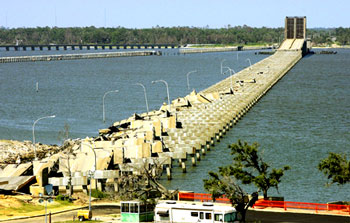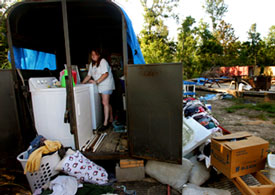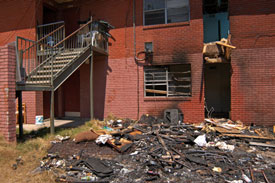By Richard Muhammad

(FinalCall.com) – The one-year anniversary of Hurricane Katrina brought the focus back to New Orleans, but Gulf Coast communities in Mississippi still struggle to get attention and help for areas swept away by last summer’s deadly super storm.
“We have been so overshadowed. In Mississippi, we have total neighborhoods that have been just completely wiped off the map. Not even streets were left,” said Cynthia Seawright Wright, who lives in Ocean Springs, Miss. Before the hurricane, she lived in Escawtapa, Miss. Driving around nearby Gulfport and Biloxi, Miss., after the storm, she couldn’t find her way around areas she’d known all her life. Most apartment buildings were destroyed, she observed.
“We are still living in trailers that are meant for you to live in for a few days,” said Darneice Williams, who is raising her granddaughter Brianna since her son has been deployed to Iraq. He has not been allowed to come to Mississippi to tend to his family because the Army does not want him “injured” trying to help rebuild, she said. Meanwhile, she said she was diagnosed with severe liver damage from drinking dirty water in the FEMA trailers. “I need to talk to someone, I need psychological help; I cannot get it.
I don’t know what to do,” she shared.
“There is still such a long way to go and still a lot of work to be done,” commented Reverend George Rouse, pastor of Missionary Baptist Church in Gulfport, Miss. He and other faith-based leaders and churches are renovating and putting survivors back in their homes. He hasn’t seen a lot of federal government help. About one in 10 people knocked out of their homes are back inside, he said. FEMA trailers dot many places as Mississippians await help and try to rebuild on their own.
“The government isn’t the one who are really putting the people in houses; it’s actually the church or faith-based organizations,” Rev. Rouse informed. “FEMA has put people in their FEMA trailers, however, the church stepped up and put people in their homes,” he added, quoting one of his church deacons.

Jaribu Hill, executive director of the Mississippi Workers’ Center for Human Rights in Greenville, sees grassroots organizations and community leaders at work. But, she pointed out, there is no excuse for the lack of federal government support and action. No one in the government has been held accountable, she contended.
The priority is rebuilding casinos with promises of economic development, without a commitment to building low-income housing, according to Ms. Hill. Casinos offer low-wage jobs that help keep people in poverty, she said. Questions remain about public education and getting students on track, environmental hazards abound, workers are getting hurt at unsafe sites and some immigrant workers aren’t paid at all, she added.
“They are rebuilding for the sake of profit, not for the rebuilding of peoples’ lives,” she said.
Her group and the U.S. Human Rights Network opened the Mississippi Hurricane Media Center in Biloxi, Miss., to try to draw attention and document survivors’ experiences. She wants survivors to be given a real role and voice in the rebuilding effort, government commitments to make survivors whole, and a push for a better way of life. FEMA trailers need to be replaced with decent, affordable housing, she insisted.
“People don’t have a desire to go back to the same conditions they were in before Katrina. Katrina exposed the gaps and the underclass and the face of the poor. It only comes up when people are put on the national media. Dead bodies floating in the water, people trying to swim to save themselves–it’s a media event. That’s the only reason we’re seeing the poor in the United States,” she said.
Worst of all, she continued, the basic things that people want–food, clothing, shelter, safety, income and education–are human rights. The U.S. has been exposed as a major human rights violator, and sham democracy as it exports “freedom” around the world, she argued.
“We are seeing people use this event as a media opportunity, but it is an opportunity to change things,” she continued. Ms. Hill believes unity between Black and Brown people, visible solidarity from Black communities outside the Gulf Coast, a constant demand for updates and answers about why residents can’t return or rebuild are needed.
“We need people from every community letting the government know that this is not an isolated incident, but you have to be concerned about all of us,” she said.
According to Gulf Coast activists, 231 people died from Katrina, 750,000 people were displaced by hurricanes Rita and Katrina, damages in Mississippi hit $125 billion, the state’s fishing and shrimp industry is still reeling, unemployment remains high, billions are needed to repair public schools and just 12 percent of $2 billion in federal contracts went to the state.
Housing remains a major concern, activists add. Just over 100,000 people still live in temporary housing and 274,000 individuals and families still receive housing assistance from FEMA, which provided over 37,000 trailer and mobile homes in Mississippi.

“Stranded, lost, left out and homeless,” said Karen Madison, of the L.C. Jones public housing development in Gulf Port, Miss., describing the plight of residents. Some buildings were patched up to keep residents in apartments, but now the property is going up for sale, she said.
Federal officials promise housing vouchers and transfers to other developments, she said, adding that three public housing complexes with more than 3,000 residents each are closing. “I don’t know of no other public housing around here that they could move us to,” she said.
The 32-year-old mother of three is worried about moving further from work, and where her children will go to school. “To me, they’re just telling us, you ain’t got nothing, get out. If there was anywhere to go, we wouldn’t be having all these FEMA trailers out here,” she said. “We have no help, other than working. And those that can’t work, they’re ground zero.”
Ms. Seawright Wright watched the storm hit the Gulf Coast on TV in Atlanta, having evacuated her home. When she came back to the mostly Black community of Moss Point, Miss., neighbors had stacked possessions on the side of roads, trying to salvage things. She found four feet of water inside her home.
“I walked in the house, turned around and walked out,” she recalled. “I did not want to touch anything that had been in that sewage water.” She was worried about what a nearby industrial plant and a water treatment facility might have dumped in the water and environmental hazards. Her possessions, packed in boxes and suitcases on the floor of a friend’s home in anticipation of moving, were drenched. When she saw her friend’s bathtub and commode filled with three to four inches of a blue-green sludge, it confirmed her decision to abandon everything.
Later, she found out Moss Point had high levels of arsenic left after floodwaters receded and many suffered from rashes and respiratory problems. Violence, suicides and depression have increased, she said.
The Red Cross came out the third week after the storm, the Salvation Army showed up late and dumped “funky old clothes” in church parking lots and at shopping centers, she further recalled.
By that time, she had started her own emergency distribution effort. She recruited her sister, Toni Seawright, who was the first Black woman chosen as Miss Mississippi, to help make appeals for assistance. With some news coverage and some breaks, help started to pour in, she said.
Then, there were problems, with people treated badly and questions about how a pastor was using donated money, according to Ms. Seawright Wright. She turned to another pastor in Moss Point and went to work. Out of her efforts was born An Outreach of Love, a faith-based group. “We called it that because we weren’t getting paid. We still don’t get paid,” said Ms. Seawright Wright, who receives disability payments.
(Distributed by the Katrina Information Network and the Hurricane Katrina Media Center.)












